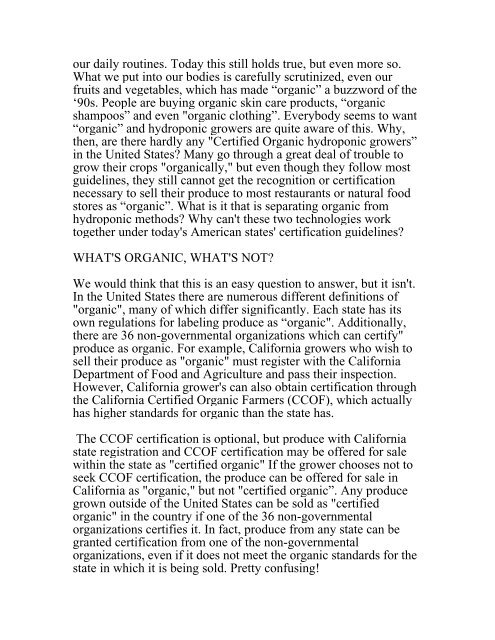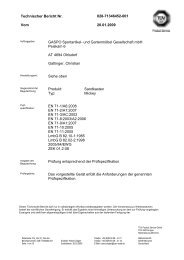The debate on "Organics" and "Hydroponics" There is a ... - Exaco
The debate on "Organics" and "Hydroponics" There is a ... - Exaco
The debate on "Organics" and "Hydroponics" There is a ... - Exaco
You also want an ePaper? Increase the reach of your titles
YUMPU automatically turns print PDFs into web optimized ePapers that Google loves.
our daily routines. Today th<strong>is</strong> still holds true, but even more so.<br />
What we put into our bodies <strong>is</strong> carefully scrutinized, even our<br />
fruits <strong>and</strong> vegetables, which has made “organic” a buzzword of the<br />
‘90s. People are buying organic skin care products, “organic<br />
shampoos” <strong>and</strong> even "organic clothing”. Everybody seems to want<br />
“organic” <strong>and</strong> hydrop<strong>on</strong>ic growers are quite aware of th<strong>is</strong>. Why,<br />
then, are there hardly any "Certified Organic hydrop<strong>on</strong>ic growers”<br />
in the United States? Many go through a great deal of trouble to<br />
grow their crops "organically," but even though they follow most<br />
guidelines, they still cannot get the recogniti<strong>on</strong> or certificati<strong>on</strong><br />
necessary to sell their produce to most restaurants or natural food<br />
stores as “organic”. What <strong>is</strong> it that <strong>is</strong> separating organic from<br />
hydrop<strong>on</strong>ic methods? Why can't these two technologies work<br />
together under today's American states' certificati<strong>on</strong> guidelines?<br />
WHAT'S ORGANIC, WHAT'S NOT?<br />
We would think that th<strong>is</strong> <strong>is</strong> an easy questi<strong>on</strong> to answer, but it <strong>is</strong>n't.<br />
In the United States there are numerous different definiti<strong>on</strong>s of<br />
"organic", many of which differ significantly. Each state has its<br />
own regulati<strong>on</strong>s for labeling produce as “organic". Additi<strong>on</strong>ally,<br />
there are 36 n<strong>on</strong>-governmental organizati<strong>on</strong>s which can certify"<br />
produce as organic. For example, California growers who w<strong>is</strong>h to<br />
sell their produce as "organic" must reg<strong>is</strong>ter with the California<br />
Department of Food <strong>and</strong> Agriculture <strong>and</strong> pass their inspecti<strong>on</strong>.<br />
However, California grower's can also obtain certificati<strong>on</strong> through<br />
the California Certified Organic Farmers (CCOF), which actually<br />
has higher st<strong>and</strong>ards for organic than the state has.<br />
<str<strong>on</strong>g>The</str<strong>on</strong>g> CCOF certificati<strong>on</strong> <strong>is</strong> opti<strong>on</strong>al, but produce with California<br />
state reg<strong>is</strong>trati<strong>on</strong> <strong>and</strong> CCOF certificati<strong>on</strong> may be offered for sale<br />
within the state as "certified organic" If the grower chooses not to<br />
seek CCOF certificati<strong>on</strong>, the produce can be offered for sale in<br />
California as "organic," but not "certified organic”. Any produce<br />
grown outside of the United States can be sold as "certified<br />
organic" in the country if <strong>on</strong>e of the 36 n<strong>on</strong>-governmental<br />
organizati<strong>on</strong>s certifies it. In fact, produce from any state can be<br />
granted certificati<strong>on</strong> from <strong>on</strong>e of the n<strong>on</strong>-governmental<br />
organizati<strong>on</strong>s, even if it does not meet the organic st<strong>and</strong>ards for the<br />
state in which it <strong>is</strong> being sold. Pretty c<strong>on</strong>fusing!














